On our first night in Elmira, Ny., we stayed at a bed and breakfast called the Painted Lady. The rooms were Twain-themed because Samuel Clemens had spent a significant portion of his life in Elmira, where he wrote some of his most important works. Loren was staying in Mark Twain’s Retreat, Alyssa in Becky’s Sanctuary, and I was happily left with Olivia’s Rose Garden, a palatial dream—memory foam mattress, jetted bathtub, mini-fridge—were it not for one thing. Every rose has its thorn, as they say. This thorn was porcelain and fitted in a colonial dress.
As I waited for the tub to fill with hot water and as I drizzled bath salts into the bubbling cauldron of comfort, I kept glancing over at the doll, perched on a chest in the bathroom. I expected that at any moment she would hop off, hobble toward me and bite my lower leg. Such was my fear. So I stared her down like John Wayne. Who would make the first move?
Quick on the draw, I slipped into the bathtub as soon as the water level was high enough to allow jet action. For good measure and modesty, I drew the shower curtain shut and prayed to Olivia Langdon Clemens for rosy respite.
Elmira is our seventh stop so far, not including brief jaunts in Alton and Springfield, Ill., and Vincennes, Ind. Almost three weeks in, we’ve already had a feel for the places we’ve visited, a feel for America itself. It’s a strange feeling leaving these cities and towns behind and getting on the interstate. Strange because I know I won’t return to, say, Peru, Ind., anytime soon.
This idea of place has been on my mind lately. Maybe it all started when I thought about how old the Painted Lady is (136 years) and how Twain might have played billiards downstairs during his Elmira years. I wonder if there was something about this town that inspired Twain’s deluge of writing.
Places transform people more than people can ever transform places. People are proud of places, escape from places, settle in places. Given the nature of our adventure, I figure it’s appropriate to be thinking about such things. Twain himself sure did. In his biography Mark Twain: A Life, Ron Powers writes, “Mark Twain’s steamboat years remained the most hallowed period of his life, and formed the epoch most often associated with him in American design and folklore. The Mississippi River dominates two of his greatest books and infuses their prose with unforgettable imagery and narrative tension.”
The three of us were having dinner at Charlie’s Café, a quick stroll from the Painted Lady and I asked the question, “Do you think the topography someone grows up with affects the sort of person they become?”
Alyssa is from Pittsburgh, which in pictures looks like a nice hilly riverfront city. Loren is from New York City, which I guess is the center of the universe. And I’m from Salt Lake City, ensconced in the Rocky Mountains and reeking of the lake for which it is named. Does being from the mountains make me more adventurous or willing to take risks?
Are coastal people too good for you? Do swamp-dwellers like a little mystery in their lives? How about the inhabitants of deserts? Do they have a refined sense of communion with death, and subsequently the fleetingness of beauty? I wonder how glacial terrain would affect the psyche.
After visiting the Elmira Correctional Facility (“We get everyone from DWIs to mass murderers in here,” Deputy Superintendent Steve Wenderlich said to me), we continued to Quarry Farm where Twain penned The Adventures of Huckleberry Finn, A Tramp Abroad, and Life on the Mississippi, among others. We saw for ourselves the view from Twain’s study, which he said “commands leagues of valley and city and retreating ranges of distant blue hills.” Partially obscured by trees, we could still make out the serpentine Chemung River, which no doubt reminded Twain of the Mississippi. And if any terrain were conducive to bringing back memories and to writing about them, the receding hills of Pennsylvania would probably be it.
Before continuing on to New York City, we watched “7th Street,” a documentary by Josh Pais about the changes in the Lower East Side over a ten-year period. A quote from the film really stood out to me:
“There are two ways to learn about the world. One way is to travel all over the planet and see all the different lands. And the other way is to stay in one place.”
The three of us have obviously opted for the former. The more people we meet, however, the clearer it becomes that staying put has its merits, too. But if it means putting miles between me and that wretched doll, I’ll take the road trip any day.
Dan


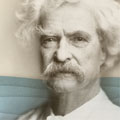
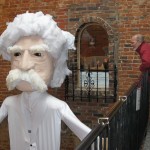
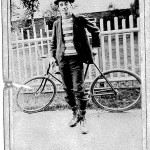



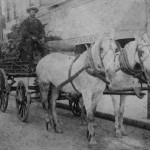


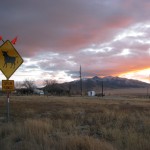
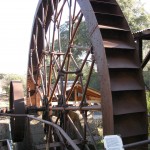
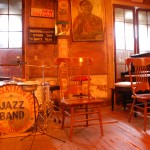




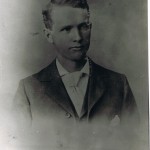


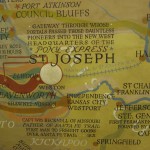


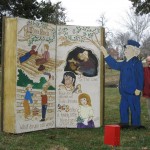

I am the Deputy Supt. of Security at the Elmira Prison…..are there any photos of the prison visit?